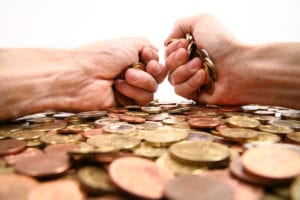
Greed – what is it?
- Sometimes we think we have been greedy, but in fact we have not.
- Sometimes we don’t think we have been greedy, but in fact we have.
Greed is the desire for something:
- More than what we need.
- More than what we are due.
Gospel begins with a person asking Jesus to tell his brother to share an inheritance with him.
Jesus replied, “Friend, who appointed me as your judge and arbitrator?” (Luke 12:14)
Jesus addressed the crowd and said, “Take care to guard against all greed…” (Luke 12:15)
In our culture today, where it seems fair to divide an inheritance in equal parts to all the surviving members of a family, it may seem that Jesus wasn’t speaking fairly.
Primogeniture – the right, by law or custom, of the first-born son to inherit his parent’s entire or main estate. In the biblical tradition, the first-born son gets a double portion of an inheritance according to Deuteronomy 21:15-17. For example, if there are two sons, the inheritance is divided three ways and the first-born gets two parts. You can guess that the person who asked Jesus to tell his brother to share the inheritance wasn’t the first-born.
So, Jesus told the crowd the parable of the rich fool. The rich fool wanted to store up all his treasures so that for the rest of his life, he can rest, eat, drink and be merry! Sounds like early retirement! But what happened to the rich fool? He died, leaving all his possessions behind; thus, echoing the Book of Ecclesiastes 1:2, “Vanity of vanities, all is vanity!”
Before you get any wrong ideas, the parable of the rich fool does not teach us to selfishly use up all our money and possessions before we die!
The Book of Ecclesiastes teaches against the common philosophy of its time (around 300 BC):
- There is no divine plan, so live life for today only.
- The grave is the ultimate end of life, why not find happiness in possessions, money, sex and power.
“Vanity of vanities” means living a meaningless life. If we live only for this world, then we are to be pitied indeed. That kind of life is like chasing the wind.
The Book of Ecclesiastes teaches us that life has meaning because it is connected to the next life. It teaches us that there really is a divine plan, and that we will ultimately be judged by God.
The Book of Ecclesiastes connects quite perfectly to the Parable of the Rich Fool. The fate of the rich fool awaits those who live only for this world: “Thus, it will be for all who store up treasures for themselves but are not rich in what matters to God.” (Luke 12:21)